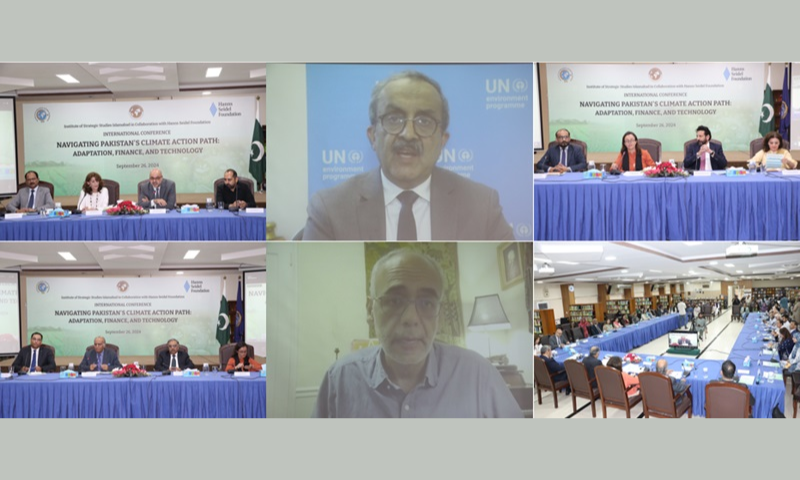ISLAMABAD: The ISSI-HSF International Conference on “Navigating Pakistan’s Climate Action Path: Adaptation, Finance, and Technology” brought together diplomats, climate experts, and academics to discuss Pakistan’s pressing climate challenges.
The event featured keynote addresses by H.E. Khazar Farhadov, Ambassador of Azerbaijan to Pakistan, and Chief Guest Senator Sherry Rehman, underscoring the country’s commitment to climate action. The discussions emphasized Pakistan’s vulnerabilities and its potential to emerge as a regional leader in climate resilience.
The conference began with two insightful panel discussions that examined key issues around climate adaptation, financing, and the role of technology in shaping Pakistan’s climate response. Experts highlighted the urgency of addressing climate challenges through innovative solutions, increased global cooperation, and strategic investments. Pakistan’s vulnerability to climate impacts was a focal point, with discussions focusing on how the country could leverage its position ahead of COP29 to drive meaningful action.
Moderated by Ms. Aisha Khan, Executive Director of the Civil Society Coalition for Climate Change, the first session explored ways to enhance Pakistan’s adaptability to climate change. Ms. Khan stressed the importance of swift action, particularly as the 2030 deadline for climate adaptation approaches. She pointed out that developing countries like Pakistan are especially at risk due to limited resources.
Mr. Samuel Rizk, Resident Representative of the UN Development Programme (UNDP) in Pakistan, emphasized the need for indigenized solutions, technology transfer, and concessional financing. He called for regional cooperation and urged the depoliticization of climate issues. Dr. Mazhar Hayat from Pakistan’s Ministry of Climate Change discussed preparations for COP29, where Pakistan plans to present itself as a responsible actor committed to global climate efforts.
Mr. Jamil Ahmed from the UN Environment Programme (UNEP) highlighted the need for immediate action to protect Pakistan’s agricultural sector from floods, droughts, and water scarcity. Dr. Faisal Ali from the Pakistan Institute of Development Economics (PIDE) advocated for alternative economic measures, including a shift to paperless environments and implementing a water-pricing system.
The second session, moderated by Dr. Neelum Nigar, Director CSP, focused on strategies for accessing global climate finance and transitioning to renewable energy and green technology. Ambassador Nauman Bashir Bhatti, Pakistan’s Ambassador to Kazakhstan, emphasized the role of global financial institutions like the Green Climate Fund (GCF). He urged Pakistan to build capacity to develop climate projects that meet international standards.
Climate finance expert Ms. Kashmala Kakakhel stressed the need for Pakistan to focus on both adaptation and mitigation, urging the country to tap into global climate funds strategically. Dr. Syed Muhammad Ali from Johns Hopkins University highlighted the inequities in global climate finance, calling for a just energy transition that balances environmental and economic needs.
Dr. Khalid Waleed from the Sustainable Development Policy Institute (SDPI) pointed out the disproportionate focus on mitigation projects, urging Pakistan to prioritize adaptation efforts as well. He mentioned the upcoming national green taxonomy, which will be a key focus for Pakistan at COP29.
Mr. Muhammad Bilal, Senior Program Manager at Hanns Seidel Foundation, concluded the event by acknowledging the insightful discussions and stressing that the ideas generated would inform Pakistan’s policy direction ahead of COP29. Ambassador Khalid Mahmood, Chairman of ISSI’s Board of Governors, reflected on the growing importance of climate discussions, urging for greater technology transfer to help developing nations like Pakistan address climate change effectively.
The conference underscored that climate change remains an existential threat for Pakistan, requiring urgent attention, global cooperation, and a balanced approach to adaptation, mitigation, and financing.


























